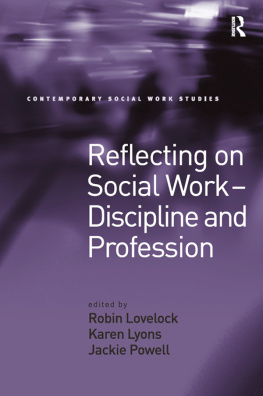Learning Matters
An imprint of SAGE Publications Ltd
1 Olivers Yard
55 City Road
London EC1Y 1SP
SAGE Publications Inc.
2455 Teller Road
Thousand Oaks, California 91320
SAGE Publications India Pvt Ltd
B 1/I 1 Mohan Cooperative Industrial Area
Mathura Road
New Delhi 110 044
SAGE Publications Asia-Pacific Pte Ltd
3 Church Street
#10-04 Samsung Hub
Singapore 049483
Nigel Horner, 2019
First published in 2003
Reprinted 2004 (twice)
Reprinted 2005
Second Edition 2006
Reprinted 2007
Third Edition 2009
Fourth Edition 2012
Reprinted 2015
Reprinted 2017 (twice)
Apart from any fair dealing for the purposes of research or private study, or criticism or review, as permitted under the Copyright, Designs and Patents Act, 1988, this publication may be reproduced, stored or transmitted in any form, or by any means, only with the prior permission in writing of the publishers, or in the case of reprographic reproduction, in accordance with the terms of licences issued by the Copyright Licensing Agency. Enquiries concerning reproduction outside those terms should be sent to the publishers.
Crown Copyright material is published with the permission of the controller of HMSO.
Library of Congress Control Number: 2018957323
British Library Cataloguing in Publication Data
A catalogue record for this book is available from the British Library
ISBN 978-1-4739-8947-4
ISBN 978-1-4739-8948-1 (pbk)
Editor: Kate Keers
Development editor: Sarah Turpie
Senior project editor: Chris Marke
Project management: Deer Park Productions
Marketing manager: Camille Richmond
Cover design: Wendy Scott
Typeset by: C&M Digitals (P) Ltd, Chennai, India
Printed in the UK
About the author
Nigel Horneris Head of the School of Health and Social Care at the University of Lincoln, where he has worked since 2007. The School delivers a broad portfolio of qualifying and post-qualifying programmes in Health and Social Care, Midwifery, Nursing, Occupational Therapy, Paramedic Science, Physiotherapy and Social Work.
Nigel began his social work career as a residential childcare worker in South London before moving into community work in Sunderland and then qualifying in social work at Glasgow University. He subsequently worked for Lincolnshire County Council in various childcare and mental health settings, before becoming a Training Officer and working in policy and development, particularly in relation to childrens services.
Nigel first published
What is Social Work? in 2003, followed by
Social Work in Education and Childrens Services (2006) (also published by Learning Matters) and
Essential Theory for Social Work Practice (Chris Beckett and Nigel Horner, 2015, 2nd edition, published by Sage).
For the youngest and oldest in my family: my two granddaughters, Darcey (born North London, 2014) and Florrie (born North London, 2016), and for my mother Biddy (born South London, 1925).
Series editors preface
During recent teaching sessions for student social workers I have been struck keenly by the changes permeating our contemporary world. Values and ethics lie at the heart of social work and social work education, and we address these throughout all the books in the series. The positions that we take in terms of values and ethics is, to an extent, determined by context, time and experience and these are expressed in different ways by students coming into social work education today. Since the turn of this century we have witnessed shifts and challenges as the marketised neoliberal landscape of politics, economy and social life may attract little comment or contest from some. We have observed the political machinery directing much of statutory social work towards a focus on individuals apart from their environment. However, we have also seen a new turn to the social in the #MeToo campaign where unquestioned entitlement to womens bodies and psychology is exposed and resisted. We have seen defiance of those perpetuating social injustices that see long-term migrants alongside todays migrants abused and shunned by society, institutions as well as individuals. It is likely that, as a student of social work, you will lay bare and face many previously unquestioned assumptions which can be very perplexing and uncover needs for learning, support and understanding. This series of books acts as an aid as you make these steps. Each book stands in a long and international tradition of social work that promotes social justice and human rights, introducing you to the importance of sometimes new and difficult concepts, and inculcating the importance of close questioning of yourself as you make your journey towards becoming part of that tradition.
There are numerous contemporary challenges for the wider world, and for all four countries of the UK. These include political shifts to the popular Right, a growing antipathy to care and support, and dealing with lies and alternative truths in our daily lives. Alongside this is the need to address the impact of an increasingly ageing population with its attendant social care needs and working with the financial implications that such a changing demography brings. At the other end of the lifespan the need for high-quality childcare, welfare and safeguarding services has been highlighted as society develops and responds to the changing complexion. As demand rises so do the costs and the unquestioned assumption that austerity measures are necessary continues to create tensions and restrictions in services, policies and expectations.
It is likely that as a social worker you will work with a diverse range of people throughout your career, many of whom have experienced significant, even traumatic, events that require a professional and caring response. As well as working with individuals, however, you may be required to respond to the needs of a particular community disadvantaged by local, national or world events or groups excluded within their local communities because of assumptions made about them.
The importance of high-quality social work education remains if we are adequately to address the complexities of modern life. We should continually strive for excellence in education as this allows us to focus clearly on what knowledge it is useful to engage with when learning to be a social worker. Questioning everything, especially from a position of knowledge, is central to being a social worker.
The books in this series respond to the agendas driven by changes brought about by professional bodies, governments and disciplinary reviews. They aim to build on and offer introductory texts based on up-to-date knowledge and to help communicate this in an accessible way, so preparing the ground for future study and for encouraging good practice as you develop your social work career. Each book is written by someone passionate about social work and social services and aims to instil that passion in others. Nigel Horners seminal text introduces you to the history, contexts and core concepts in contemporary social work. His book will help you to understand the place social work has in contemporary British society and the place you will have within it. You may think that knowledge of the history and policy context of social work is somewhat tangential to practice. Horners book will show why it is central to good social work practice.










